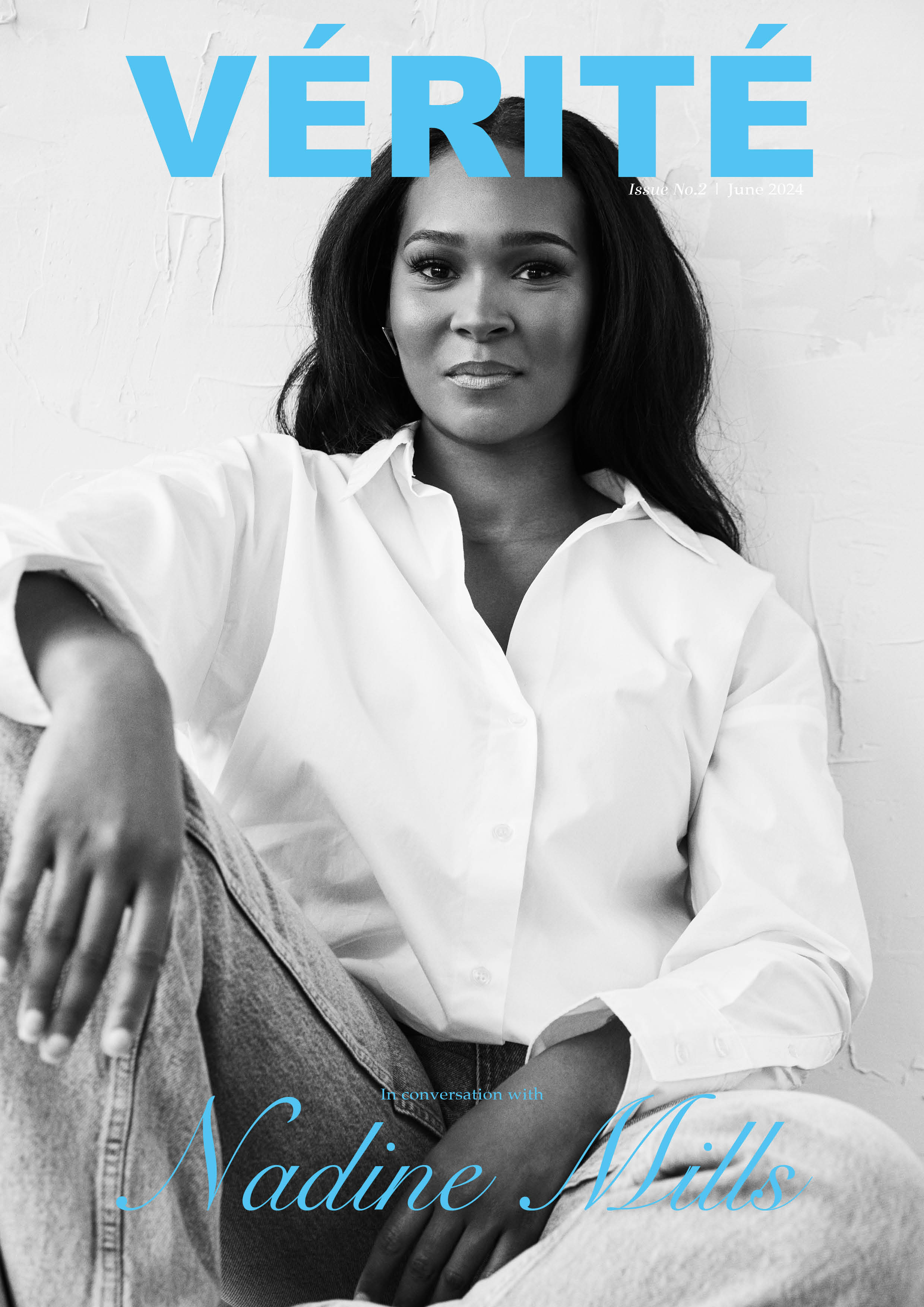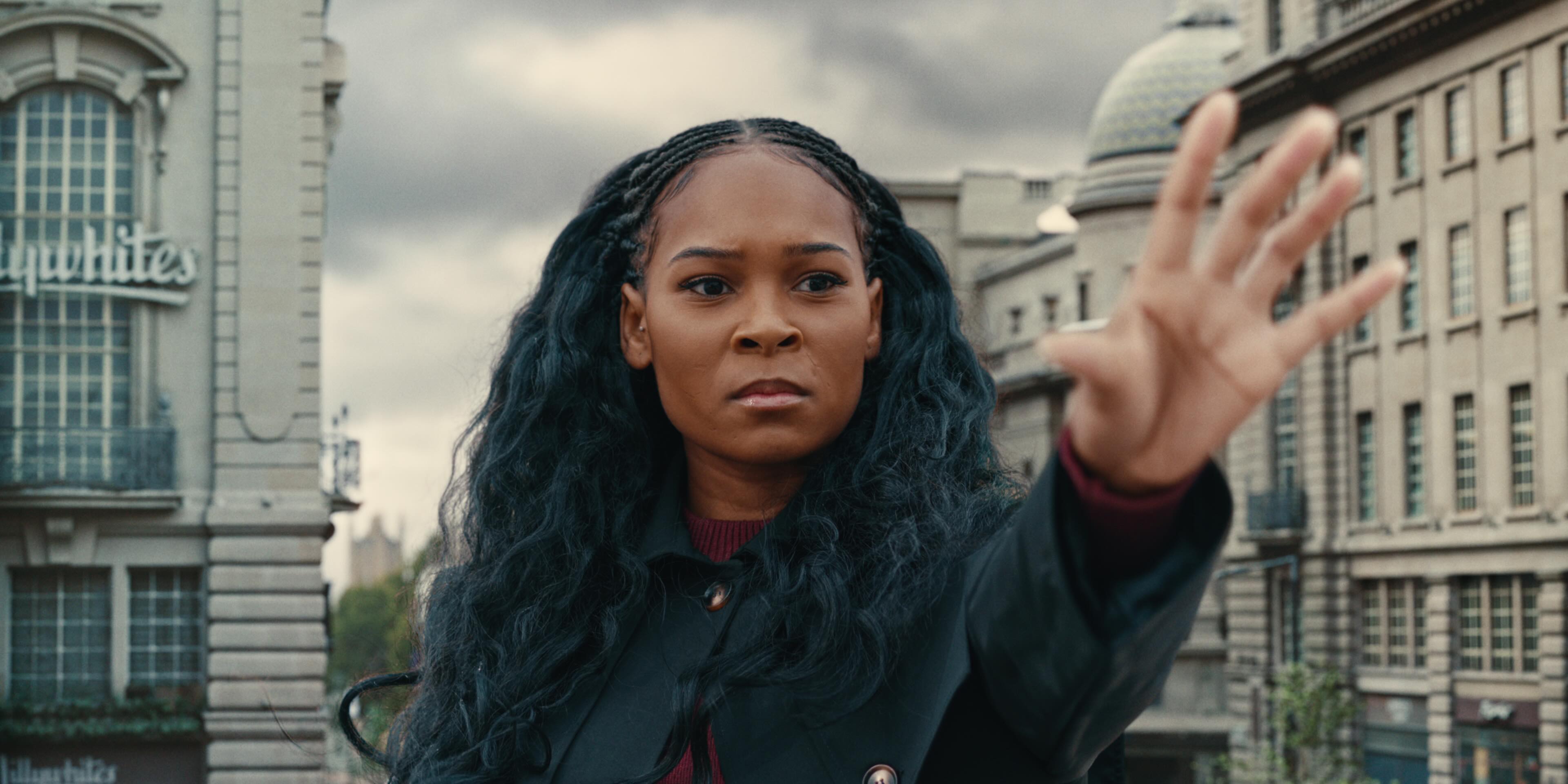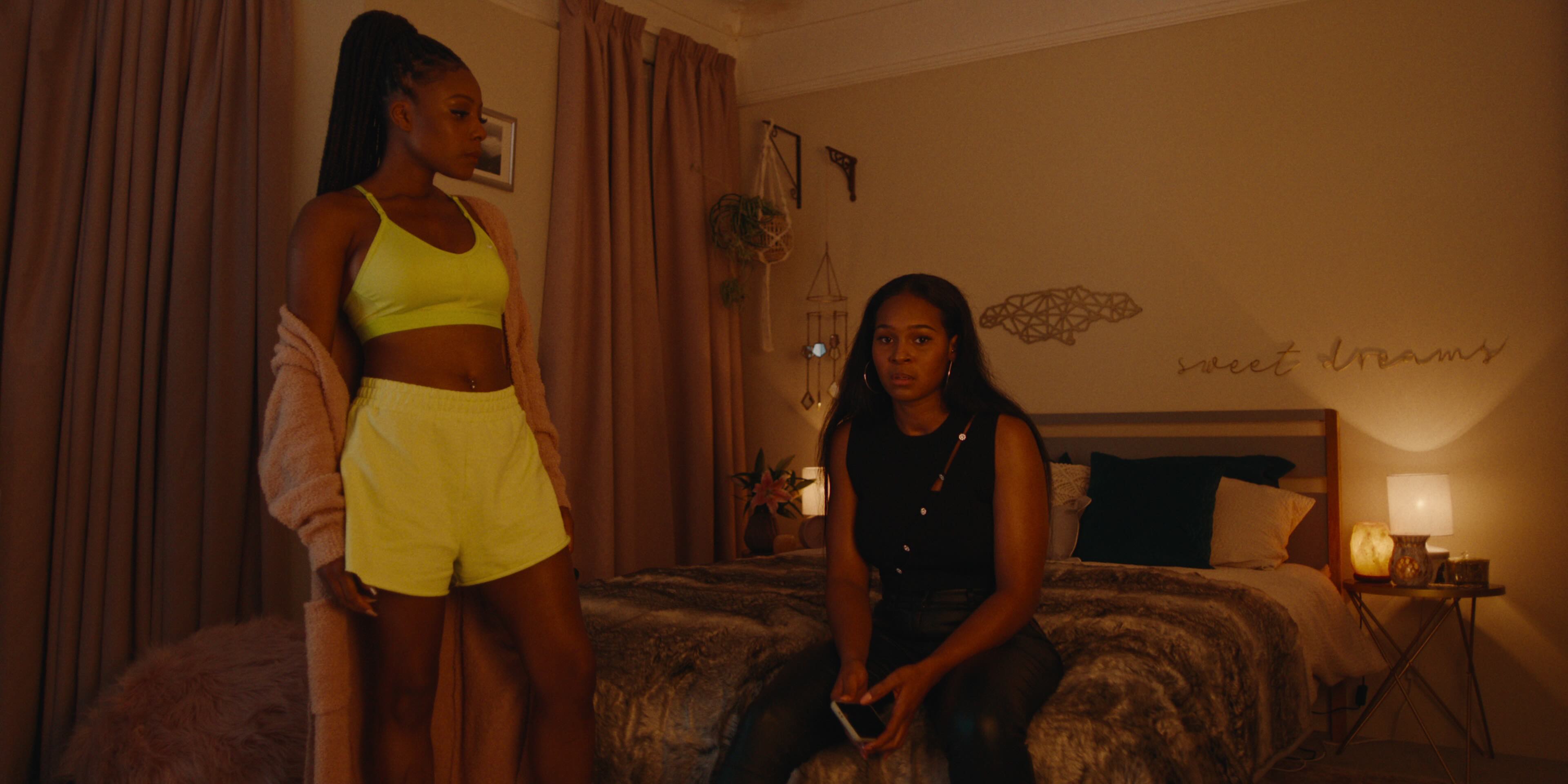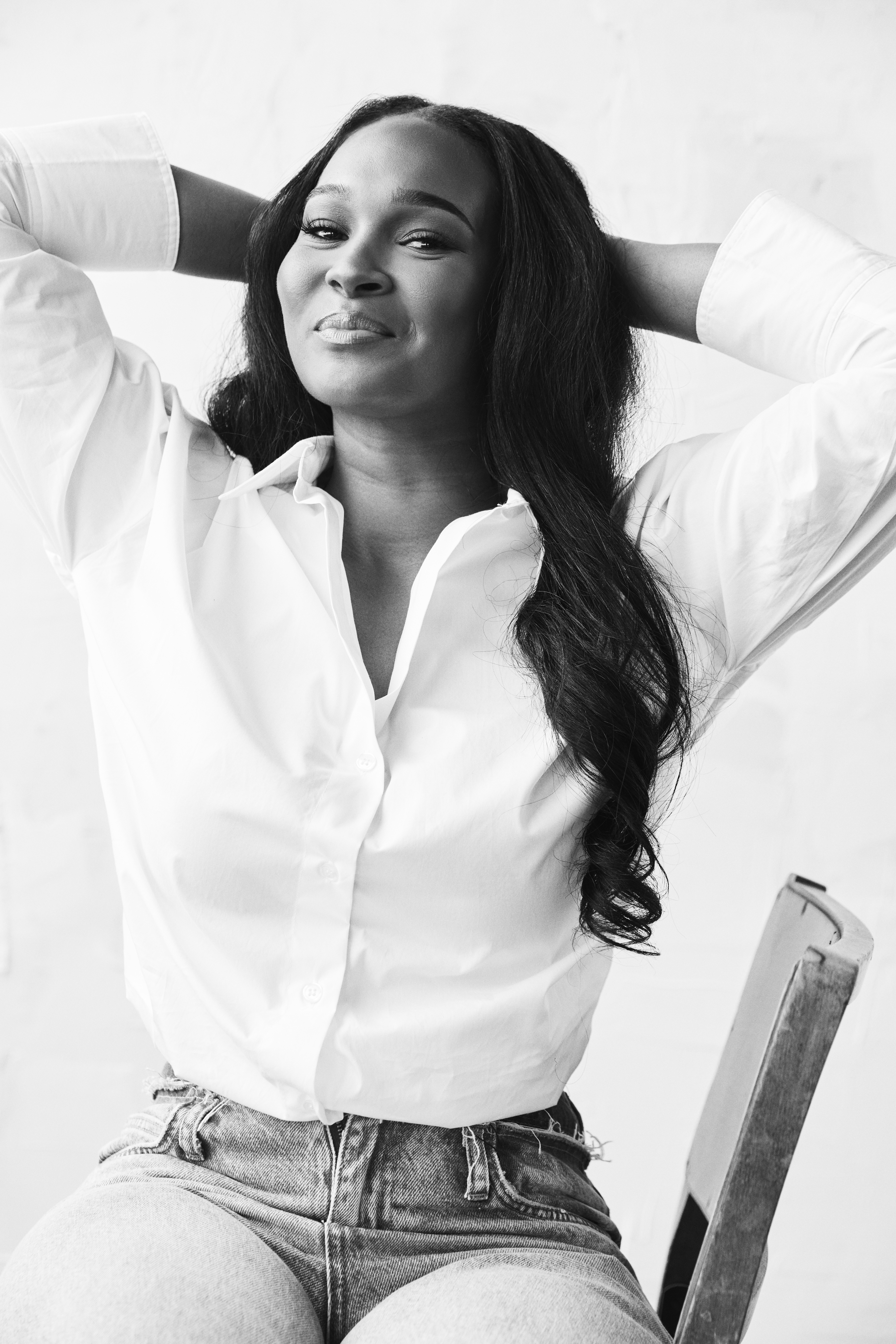
Interview by: Chandler Crump
Photos by: David Reiss
Hair: Dionne Smith
Makeup: Zakiyah Shani
Styling: Kayleigh Swan
How would you describe your craft?
NADINE MILLS: Walking in faith. Riding the wave…putting a hundred into everything that I do. It’s walking with God, that’s what it is…yeah.
At what age did you start performing? What were the early moments that sparked your desire to move towards acting professionally?
To be honest, it’s something that was always in me when I was young. I used to always perform and put on little shows for my mum and dad. I was probably that annoying child that would be like, “Watch me! Look at me! I’ve got something else for you!”
I went to school and I studied drama. I went to college and I studied drama. But I never went to [university] for [it]; I actually studied media because I wanted to learn [about what’s] behind the camera, but I was going to part-time drama classes on the weekend. It was always something that I knew I wanted to do.
However, in the UK, I would say– especially for Black people –we didn’t have much to aspire to, but the U.S. was always something that we had, so seeing Sister Sister, Moesha, and those shows [made me realize that] “This is something I can really do.” I think it’s when I booked my first short film and I was like “Ah, okay, this can genuinely be a career.” That really sparked the hunger to actually go for [acting] as a career.

Photo by David Reiss.
As a Black-British woman, did you feel as if you had to put yourself in a certain box compared to the opportunities you have now, especially with Supa Cell being created by Rapman and having that all-Black cast; do you see a difference in the timeline of it all?
I think the UK still has a long way to go with catching up in terms of a variety of roles for Black actors in general. I think Rapman is definitely going to open doors; [Supa Cell] is something different that no one has seen.
When you approach a project, are there boxes for the character(s) that need to be checked, or is it rather a feeling when you’re reading about the character? What’s your process like in terms of choosing projects?
I just want to tell great stories. I want to take a role because I’m telling a good story, so the first thing I look at is the breakdown of the character and I see if I can relate to her in some way. Is this going to be a good story, is she relatable to me? Is this something that I would be interested in going to watch?

Images courtesy of Netflix UK.
The additional layer that performers like yourselves have to find [beyond the paper] to bring a character to life is such a feat. What drew you to your character Sabrina and Supa Cell specifically?The fact that she has powers, number one.
The second thing is, she’s not just a one-dimensional character. She is this nurse who is trying to work her way up in her career. She has a younger sister, someone who she is responsible for because her parents have moved back to Jamaica to retire. And I feel like I related to her in the sense that she is someone who is very determined. She is nurturing, but she is also someone who if you cross her and the ones that she loves, she is not afraid to go off. And that’s a bit of me as well.
I like that she was this nice, down-to-earth, calming, nurturing character but there was something inside of her that could switch at any moment, and you would probably be scared coming into contact with her. I liked that aspect of playing those two different sides to Sabrina.
What superpowers would you want in the world of Supa Cell?
Invisibility.
How did Supa Cell find you, or did you find it?
It found me.
I saw [the project] had been greenlit and it was all over the magazines and the news: superpower show, by Rapman, all Black cast. I was like “Oh my gosh, I have to be a part of this.” So I contacted my agent and was like “Look, do you know about Supa Cell? I want to get an audition, get me in the room.”
I didn’t hear anything for a few months and obviously, I was just checking in with my agent. All the lead roles had gone but I didn’t care about a lead role, I just wanted to be in this show. [Another] couple of months had passed and I kind of forgot about it, so to speak. And then a friend of mine, Sheila Nortley, a producer on the show, contacts me and she’s like “I’ve got this audition for you, I think you’d be a really good for it.” And I was like “Yeah, send it to my agent.”
It was for Supa Cell and for the lead role, even though all the lead roles were gone. This was maybe five or six months down the line. I was able to get into the room. I had two auditions, and the second audition [involved] five of us going for my role and five going for my sister’s role and they would literally do a rotation.
How did you stay true to your interpretation of the character during the audition process?
There were moments when I was just sitting there meditating. Meditating on the role; on Sabrina. But I didn’t [let] it get to me. I’m walking with God, so whatever happens, happens. I’m walking in faith, if it’s meant to be, it’s meant to be, if it’s not, it’s not. And that is genuinely how I live my life.
And on this occasion, it was [meant to be].
How did you feel when you booked the role?
Oh my gosh, I cried. To be honest, before I booked this role, I was in a moment of my life where I was ready to give up. I’ve been doing it for a while. I was going to enroll and do my teaching degree because I was teaching math and English part-time. So I thought, maybe I should just do this properly and invest my time in [a] “proper” career. We all have that feeling.
So when I got [the role], I broke down in tears. I’m supposed to do this, this is the path I’m supposed to take.

Images courtesy of Netflix UK.
How was collaborating with Rapman and Netflix?Rapman is a great director. He’s very collaborative. He’ll want you to do a take with what’s on the paper, and then he will allow you to play. He’s a great storyteller and it was really good to work with someone like that because he just wants to see you win as well. He wants the best out of you, for himself, and for the culture as a whole.
And Netflix as well was really great at making sure that Rapman got what he wanted. He’s so passionate, and if there’s something he wants, he is going to fight to the end for it. The heads of departments [were all] Black, so that was a good thing as well, coming to work and knowing that your makeup is going to be on point and your hair is going to be on point. They’re going to know how to dress your body type. He ensured all the HODs were of color.

Images courtesy of Netflix UK.
In terms of preparation, besides the first iteration of Sabrina during the audition process, was there anything that you added in terms of her layers or experiences that you had that influenced what you brought to the screen?I’m an older sibling; I have a younger brother. So bringing [in] that experience helped. I was able to get in contact with a [Black] nurse as well. I also put a playlist together. But most of the time, it was just about being present and reacting opposite of my peers.
Where do you see Sabrina evolving in future seasons?
[At the end of Season 1], Sabrina is a force to be reckoned with. She comes into her own because she doesn’t want her powers, she’s the only one out of five who doesn’t want them; she just wants to work her way up in her career. I would say she’s the baddest out of all of them! My hope for Season Two is that she stays in that power, [maybe] lead [her own] crew of women.

Photo by David Reiss.
As a performer, what is your North Star?Telling great stories and using my platform to give back to the community in a way. If I can give back in some way, whether that’s through acting or helping bring others along the journey and opening doors for other Black British females…I’m hoping I can be that person for somebody.
Supa Cell premieres exclusively on Netflix on June 27th, 2024.
